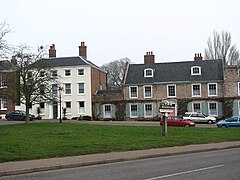Hingham, Norfolk
| Hingham | |
|---|---|
 Georgian houses gave Hingham its nickname, 'Little London' |
|
| Hingham shown within Norfolk | |
| Area | 14.98 km2 (5.78 sq mi) |
| Population | 2,367 (2011) |
| • Density | 158/km2 (410/sq mi) |
| OS grid reference | TG 022 021 |
| Civil parish |
|
| District | |
| Shire county | |
| Region | |
| Country | England |
| Sovereign state | United Kingdom |
| Post town | NORWICH |
| Postcode district | NR9 |
| Police | Norfolk |
| Fire | Norfolk |
| Ambulance | East of England |
| EU Parliament | East of England |
Hingham is a market town and civil parish in the Forehoe district in the heart of rural Norfolk, in England. The civil parish covers an area of 14.98 km2 (5.78 sq mi) and had a population of 2,078 in 944 households at the 2001 census, increasing to 2,367 at the 2011 Census. Grand architecture surrounds the market place and village green. According to an 18th-century source, a fire destroyed many of the towns buildings, leading the better off local families to build the handsome Georgian homes for which the town is known. The same source claims that the Hingham gentry were "so fashionable in their dress that the town is called by the neighbors 'Little London'".
Hingham is 17 miles (27 km) from Norwich, Norfolk’s county town. While many Hingham people now work in Norwich, commuting by car or bus, the town has maintained a strong base, providing work in a wide range of commercial businesses in its industrial estate on Ironside Way.
The many and varied local shops have the special character of a small market town but are up-to-date in what they provide. Despite the influence and attractions of neighbouring Norwich, an active and independent town life continues to thrive and grow in Hingham. A fair visits every year, setting up on the historic Fairlands (an area of several triangular greens). There is a state-run school, providing education for children from the ages of 4-11. For the purposes of local government, the parish falls within the district of South Norfolk.
The nearest railway stations are Wymondham and Attleborough, both on the Breckland Line.
In the early 17th century, a number of Puritan residents of Hingham, led by Hingham's former vicar Robert Peck and his associate Peter Hobart, emigrated to the then colony of Massachusetts, where they founded the town of Hingham. Peck had been censured by religious authorities for his Puritan practices, and his daughter had married the son of another well-known Puritan minister, John Rogers. The parishioners who left Hingham with Peck and Hobart had been so prominent in the community that the town was forced to petition Parliament for help, claiming that it had been devastated by the loss. Amongst their number were Samuel Lincoln, ancestor of President Abraham Lincoln, and Edward Gilman Sr., ancestor of Nicholas Gilman, New Hampshire delegate to the Continental Congress and signer of the U.S. Constitution. Memorials to the Gilman family, ancestors of those who went to America, are still visible in St Andrew's Church in Hingham, which also has a bust of Abraham Lincoln on the wall. (Several centuries later, the Gilmans of Hingham supplied two mayors of Norwich.)
...
Wikipedia

